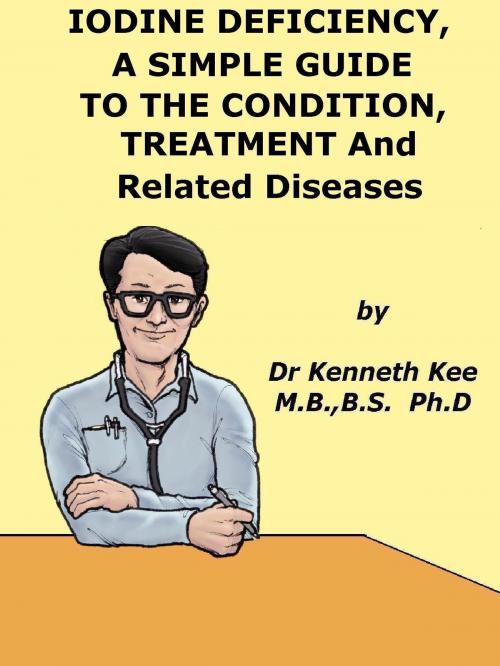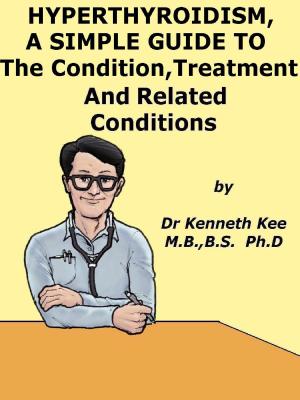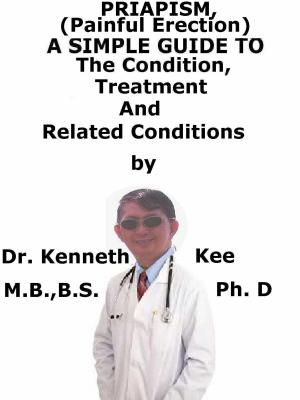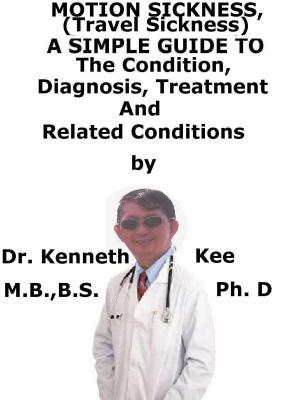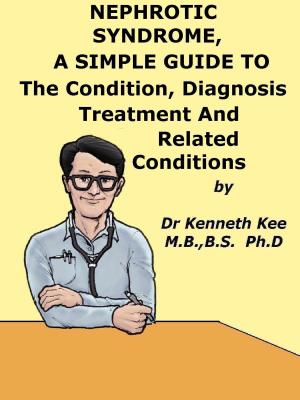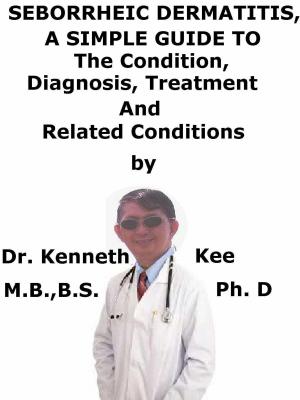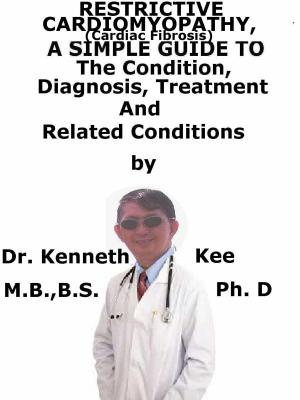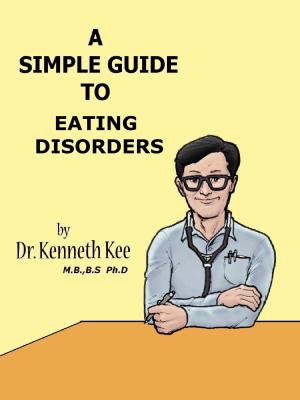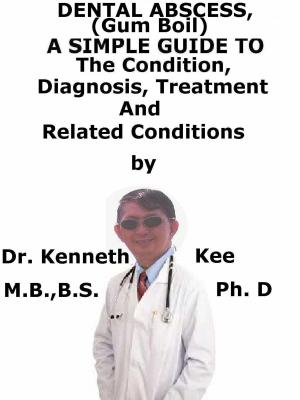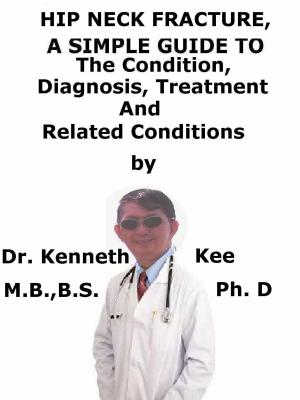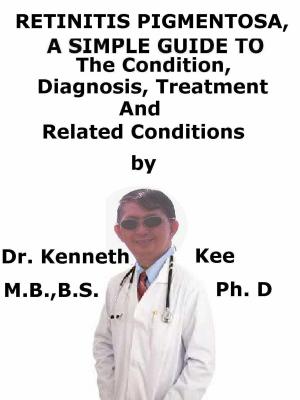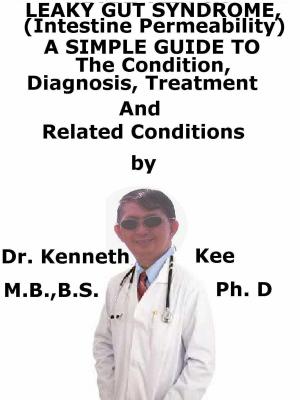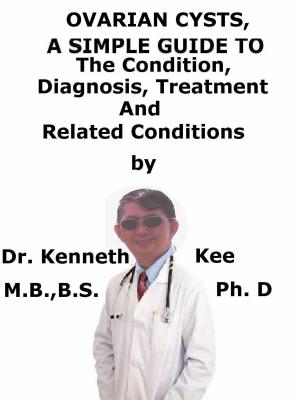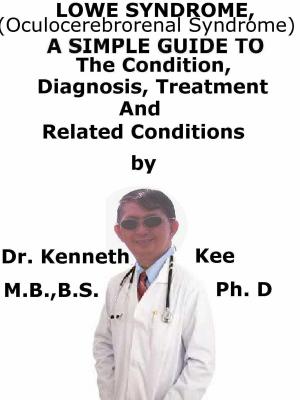Iodine Deficiency, A Simple Guide to the Condition, Treatment and Related Diseases
Nonfiction, Health & Well Being, Medical, Specialties, Internal Medicine, Endocrinology & Metabolism, Patient Care, Nutrition| Author: | Kenneth Kee | ISBN: | 9781311923271 |
| Publisher: | Kenneth Kee | Publication: | December 10, 2014 |
| Imprint: | Smashwords Edition | Language: | English |
| Author: | Kenneth Kee |
| ISBN: | 9781311923271 |
| Publisher: | Kenneth Kee |
| Publication: | December 10, 2014 |
| Imprint: | Smashwords Edition |
| Language: | English |
Iodine is an essential component of the thyroid hormone
Iodine deficiency is an important health problem
Iodine is needed for the normal metabolism of the body
Without the thyroid hormone a person cannot live normally
Iodine Deficiency is a silent disease
Severity of Iodine deficiency is inversely related to age
One cause of Iodine deficiency is malabsorption
The other cause is poor food intake function
It is a cause of low thyroid or Hypothyroidism
The low thyroid hormones can reduce metabolism
There may be depression or sadness
The body may feel fatigue and tiredness
Prevention of Iodine Deficiency is as important as treatment.
Treatment of Iodine Deficiency is taking iodine supplements
And a diet containing more seafood and iodized salt,
Yogurt, cow's milk and eggs are also good for adults
-An original poem by Kenneth Kee
Interesting Tips about the Iodine Deficiency
A Healthy Lifestyle
-
Take a well Balanced Diet
-
The goal of Iodine Deficiency treatment is the prevention of hypothyroidism and goiter.
Iodine is used to prevent iodine deficiency and its consequences including goiter.
It is also used for:
a. treating a skin disease caused by a fungus (cutaneous sporotrichosis);
b. treating fibrocystic breast disease;
c. preventing breast cancer, eye disease, diabetes, and heart disease and stroke;
d. as an expectorant.
Iodine is also used in the form of potassium iodide for radiation emergencies to protect the thyroid gland against radioactive iodides.
- Keep bones and body strong
Bone marrow produces our blood
Eat foods rich in calcium like yogurt, cheese, milk, and dark green vegetables.
Eat foods rich in Vitamin D, like eggs, fatty fish, cereal, and fortified milk.
Eat food rich in Vitamins B and C such as green vegetables and fruits
Zinc and other minerals are important to the body
- Get enough rest and Sleep
Avoid stress and tension
- Exercise and stay active.
It is best to do weight-bearing exercise such as walking, jogging, stair climbing, dancing, or lifting weights for 2½ hours a week.
One way to do this is to be active 30 minutes a day at least 5 days a week.
Begin slowly especially if a person has not been active.
- Do not drink more than 2 alcohol drinks a day for a man or 1 alcohol drink a day for a woman.
Alcohol use also increases the chance of falling and breaking a bone.
Alcohol can affect the neurons and brain cells.
- Stop or do not begin smoking.
It also interferes with blood supply and healing.
Chapter 1
Iodine
Iodine is an essential component of the thyroid hormones which regulates metabolic rate, growth and promote protein synthesis.
It is found in seafood, seaweeds, iodized salt.
Iodine a trace mineral is required by the body for the synthesis of the thyroid hormones, thyroxine (T4) and triiodothyronine (T3).
T4 contains 4 iodine atoms.
When one of the iodine atoms is stripped off of T4, it becomes T3 with 3 iodine atoms remaining.
Under normal circumstances the body contains approximately 20 to 30 mg of iodine, most of which is stored in the thyroid gland located in the front of the neck just under the voice box.
Smaller amounts of iodine are also found in lactating mammary glands, the stomach lining, salivary glands and in the blood.
As a component of the thyroid hormones thyroxine (T4) and triiodothyronine (T3), iodine is essential to human life.
Without sufficient iodine, the body is unable to synthesize these hormones and because the thyroid hormones regulate metabolism in every cell of the body and play a role in virtually all physiological functions, an iodine deficiency can have a devastating impact on the health and well-being.
TABLE OF CONTENT
Introduction
Chapter 1 Iodine Deficiency
Chapter 2 Interesting Facts about Iodine Deficiency
Chapter 3 Treatment of Iodine Deficiency
Chapter 4 Hypothyroidism
Chapter 5 Goiter
Chapter 6 Hyperthyroidism
Iodine is an essential component of the thyroid hormone
Iodine deficiency is an important health problem
Iodine is needed for the normal metabolism of the body
Without the thyroid hormone a person cannot live normally
Iodine Deficiency is a silent disease
Severity of Iodine deficiency is inversely related to age
One cause of Iodine deficiency is malabsorption
The other cause is poor food intake function
It is a cause of low thyroid or Hypothyroidism
The low thyroid hormones can reduce metabolism
There may be depression or sadness
The body may feel fatigue and tiredness
Prevention of Iodine Deficiency is as important as treatment.
Treatment of Iodine Deficiency is taking iodine supplements
And a diet containing more seafood and iodized salt,
Yogurt, cow's milk and eggs are also good for adults
-An original poem by Kenneth Kee
Interesting Tips about the Iodine Deficiency
A Healthy Lifestyle
-
Take a well Balanced Diet
-
The goal of Iodine Deficiency treatment is the prevention of hypothyroidism and goiter.
Iodine is used to prevent iodine deficiency and its consequences including goiter.
It is also used for:
a. treating a skin disease caused by a fungus (cutaneous sporotrichosis);
b. treating fibrocystic breast disease;
c. preventing breast cancer, eye disease, diabetes, and heart disease and stroke;
d. as an expectorant.
Iodine is also used in the form of potassium iodide for radiation emergencies to protect the thyroid gland against radioactive iodides.
- Keep bones and body strong
Bone marrow produces our blood
Eat foods rich in calcium like yogurt, cheese, milk, and dark green vegetables.
Eat foods rich in Vitamin D, like eggs, fatty fish, cereal, and fortified milk.
Eat food rich in Vitamins B and C such as green vegetables and fruits
Zinc and other minerals are important to the body
- Get enough rest and Sleep
Avoid stress and tension
- Exercise and stay active.
It is best to do weight-bearing exercise such as walking, jogging, stair climbing, dancing, or lifting weights for 2½ hours a week.
One way to do this is to be active 30 minutes a day at least 5 days a week.
Begin slowly especially if a person has not been active.
- Do not drink more than 2 alcohol drinks a day for a man or 1 alcohol drink a day for a woman.
Alcohol use also increases the chance of falling and breaking a bone.
Alcohol can affect the neurons and brain cells.
- Stop or do not begin smoking.
It also interferes with blood supply and healing.
Chapter 1
Iodine
Iodine is an essential component of the thyroid hormones which regulates metabolic rate, growth and promote protein synthesis.
It is found in seafood, seaweeds, iodized salt.
Iodine a trace mineral is required by the body for the synthesis of the thyroid hormones, thyroxine (T4) and triiodothyronine (T3).
T4 contains 4 iodine atoms.
When one of the iodine atoms is stripped off of T4, it becomes T3 with 3 iodine atoms remaining.
Under normal circumstances the body contains approximately 20 to 30 mg of iodine, most of which is stored in the thyroid gland located in the front of the neck just under the voice box.
Smaller amounts of iodine are also found in lactating mammary glands, the stomach lining, salivary glands and in the blood.
As a component of the thyroid hormones thyroxine (T4) and triiodothyronine (T3), iodine is essential to human life.
Without sufficient iodine, the body is unable to synthesize these hormones and because the thyroid hormones regulate metabolism in every cell of the body and play a role in virtually all physiological functions, an iodine deficiency can have a devastating impact on the health and well-being.
TABLE OF CONTENT
Introduction
Chapter 1 Iodine Deficiency
Chapter 2 Interesting Facts about Iodine Deficiency
Chapter 3 Treatment of Iodine Deficiency
Chapter 4 Hypothyroidism
Chapter 5 Goiter
Chapter 6 Hyperthyroidism
